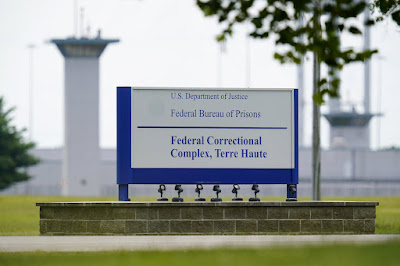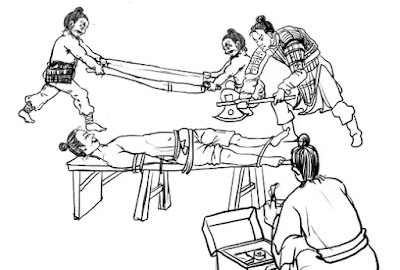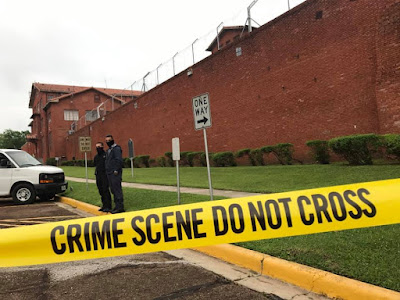 |
| Louisiana's death row |
Louisiana's death penalty is an incredibly expensive, entirely arbitrary, and an error-prone monument to the failures of big government. The Louisiana Legislature is considering 2 bills to replace the death penalty with life without parole, saving Louisiana - under conservative estimates - at least 10 million dollars annually. Not only is Louisiana's death penalty expensive, it is particularly error-prone. As Frank Baumgartner and others have noted, some 82 % of Louisiana death sentences imposed since 1976 have been reversed. And with last month's exoneration of Rodricus Crawford, 11 individuals sentenced to death in Louisiana have been released from prison without any charges whatsoever. By any measure, Louisiana taxpayers are getting scammed.
Jeff Sadow's column of May 6 - suggesting Louisiana's death penalty might save lives by deterring capital murder - is both empirically and logically moribund, and is counter to the views of virtually all the top criminologists in the United States In 2012, the renowned National Research Council, a division of the National Academy of Sciences and composed of the foremost scholars in the United States, reviewed all the research done on the deterrence question, and concluded that there is not a shred of evidence that the death penalty has any effect on the homicide rate. Their report also discredited the small number of studies that had claimed to find a deterrent effect. And, as one of us found in a 2009 study, 95 % of the nation's top criminologists - a group to which it seems unlikely Sadow belongs - rejected the idea that the death penalty is a better deterrent than life without parole to the commission of homicide.
Over the last 25 years, the murder rate in states without the death penalty has been consistently lower than in states with the death penalty. Research in Arizona and Oklahoma suggests that having the death penalty increases rather than reduces the number of murders - indicating that it might actually have a brutalizing effect, increasing homicides and detracting from the valuing of life. There is reason to suspect that this brutalizing effect exists in Louisiana - where the state has the highest murder rate in the country. If the death penalty deterred, Louisiana would have a lower murder rate than states like New Jersey, New York and Michigan, states that have already sent their death penalty statutes to the junkyard.
But one doesn't need a Ph.D. to question the deterrent value of the death penalty. America's police chiefs identify the death penalty as the last-ranked priority in reducing crime, and the most inefficient use of taxpayer dollars. And more specifically, using the death penalty to deter murders suggests both a rational mindset and a valuing of life regularly missing from those who commit murder. The last 2 defendants on Louisiana's death row who have died did so voluntarily - one with the assistance of the state (Gerald Bordelon) and one alone in his cell (Terrance Carter). For many, life imprisonment is an even worse punishment than death on the gurney.
In the end, even Sadow must acknowledge that the death penalty that currently exists in Louisiana - with 1 (voluntary) execution in the last 15 years, and numerous errors - performs no deterrent function. Sadow suggests that the problems with capital punishment in Louisiana might be fixed, cases expedited, assurances made - and that with a few constitutional short-cuts and frequent executions it might be able to deter crime. The country that Sadow is describing, however, is not America - it's maybe Saudi Arabia. And when Sadow proposes a death penalty system that has reduced the risk of wrongful execution to zero, he is imagining a regime of perfection that does not exist.
Criminologists agree, the best way to "deter" crime is to prevent the conditions that lead to it: better education, more support from positive role models, better mental health treatment. Louisiana has to decide whether it wants to continue spending millions of dollars on a system that does not deter, that does not provide justice, and that that has a demonstrable record that it gets it wrong far more often than it gets it right. We suggest that those in favor of such system be sent the bill for it. And we also suggest that academics think twice before disseminating unsubstantiated pseudo-science, especially when millions of dollars - along with the conscience of the community - are at stake.
🔗Source: The Advocate, Guest Column, Michael L. Radelet, May 11, 2017. Mr. Radelet, a sociologist at the University of Colorado, has published research and testified as an expert on death penalty issues. Ben Ben Cohen is of counsel at the Promise of Justice Initiative.
⚑ | Report an error, an omission, a typo; suggest a story or a new angle to an existing story; submit a piece, a comment; recommend a resource; contact the webmaster, contact us:
deathpenaltynews@gmail.com.
Opposed to Capital Punishment? Help us keep this blog up and running! DONATE!






.jpg)





